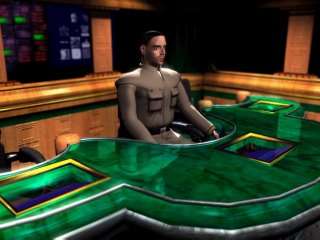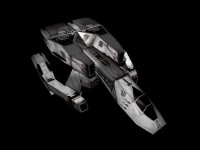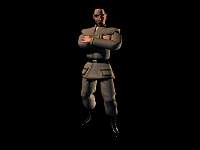Difference between revisions of "Terrans"
(→Culture: "The Vasudans view Terrans as a particularly arrogant and paranoid race.") |
(→Culture: I removed the "psychological conditioning" sentence and the "they developed arrogance and hostility towards other races" sentence) |
||
| Line 10: | Line 10: | ||
==Culture== | ==Culture== | ||
| − | [[Image:Terran3.jpg]] <br> Terran culture is founded on the premise of social equality of all Terrans | + | [[Image:Terran3.jpg]] <br> Terran culture is founded on the premise of social equality of all Terrans. |
Terrans are permitted to choose their own careers, and do what they enjoy within the limits of safety. Customs vary widely depending on the original nationality of the individual. Clothing is always worn and is frequently stylized depending on the occasion. Terran language is based on [[wikipedia:American English|American English]], which was a homogenization of several older languages. Religion is entirely dependent on the individual, with little government interference. | Terrans are permitted to choose their own careers, and do what they enjoy within the limits of safety. Customs vary widely depending on the original nationality of the individual. Clothing is always worn and is frequently stylized depending on the occasion. Terran language is based on [[wikipedia:American English|American English]], which was a homogenization of several older languages. Religion is entirely dependent on the individual, with little government interference. | ||
Revision as of 13:04, 25 January 2010
Terrans, or humans, are bipedal, carbon-based life forms that evolved from primates several thousand years ago on the third planet in the Sol system. They have an internal skeleton that supports and protects all their internal organs, musculature, and external skin.
Contents
Physiology
Compared to Vasudans or Shivans, or even many terrestrial animals, humans are physically weak, able to lift only slightly more than their own body weight (although the species encompasses a wide variety of exceptions). Humans have circumvented this weakness by using their relatively compact and powerful brains to develop tools that give them advantages over their adversaries and the ability to manipulate/change their environments. The ability to reason and use logic has enabled this species to outsmart their competitors. The combination of intelligence and versatility has given the Terran species the flexibility it needed to adapt to the various threats it has faced, and allowed Terrans to evolve from tribal, nomadic primates (not entirely unlike their progenitors) to a spacefaring race.
History
To be filled in later.
Culture

Terran culture is founded on the premise of social equality of all Terrans.
Terrans are permitted to choose their own careers, and do what they enjoy within the limits of safety. Customs vary widely depending on the original nationality of the individual. Clothing is always worn and is frequently stylized depending on the occasion. Terran language is based on American English, which was a homogenization of several older languages. Religion is entirely dependent on the individual, with little government interference.
While the individual human is usually polite, reasonable, and educated, as a group they can often exhibit irrational behavior. Politicians and dictators in the past have exploited these traits for their own gain. The Vasudans view Terrans as a particularly arrogant and paranoid race.
Technology

Terran ship design has not far departed from the utilitarian cylindrical segments and boxes that made up the first Terran spaceships and space stations. Dull grays and beiges were hallmarks of Terran design through the 24th century. They were utilitarian and cheap to produce, with embellishment limited to stripes of paint and squadron insignia. Despite this, Terran design aesthetics have held to the military-industrial themes. Legendary warships like the GTF Apollo, GTB Medusa, and GTD Orion are considered by many to represent the finest in unadulterated Terran design. The familiar lines and sturdy blocks are reassuring reminders of the durability and power of the ships. After Vasudan and Shivan technologies began being implemented, Terran design took a softer turn. Fighters and bombers became the hot-rods of their generation, with the sleek GTF Hercules Mark II, GTB Artemis, and GTCv Deimos adorning many a Terran teenager's wall.
Weaponry on Terran ships is very diverse, reflecting both Terran adaptability for different circumstances and the philosophy that pilots should be able to customize their loadout to their own tastes. All-purpose weapons such as the Subach HL-7, Avenger, and Prometheus are complemented by weapons that have a special effect upon their targets, like the kinetic effect of the Flail rifle and the energy-draining abilities of the Lamprey. Kinetic-energy weapons were widely used until pulse cannons were developed. Early energy-based weapons were distinctly gaseous in their aural signatures and visual identifications, due to the use of gases like argon and nitrogen used to intensify the laser pulses. Later weaponry used during the second Shivan conflict put more of an emphasis on plasma and electromagnetic weapons, such as the Circe.
Terran missile design is mostly dependent on brute force, rather than finesse. Heavy ordnance like the Phoenix line of heavy missiles and the Cyclops torpedo annihilate large targets, as Terrans prefer to use their primary weapons against smaller, faster targets. Many of the lighter missiles, such as the Interceptor, used by Terran fighters were only made possible through Vasudan improvements in aspect lock times and engine speeds.
The heavy beam cannons mounted on most NTF era Terran warships were first known to be mounted on the GTI's pet project, the GTD Hades, and was poised to overtake the surviving forces of the GTA and PVN towards the end of the Great War. The ill-fated rebellion of these engineers in their bid to overthrow the Galactic Terran Alliance apparently led to the development of the comparatively advanced weaponry. Many ship classes were re-outfitted with these new weapons, but, according to the tech room, this wasn't always practical, the primary motivation for the decommissioning of many GVD Typhon destroyers was their particular problems with the integration of large beam cannons. Several variants appear to exist, some firing a steady, unmoving beam, other "slashing" across the hull area of the target. These 'slash' beams maximize the spread of the beam fire on a wide arc across the target's hull, increasing the chances of disabling subsystems and turrets. Both Slash beams and Line-of-Sight (LOS) beams are standard by the time of the Second Shivan Incursion on Terran and Vasudan warships.
